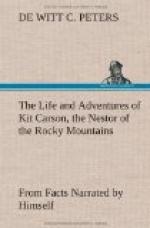It was now necessary to return without delay to their own camp, and thus anticipate the movements of the Indians, as they might conclude to make an attack in that quarter; but, on arriving there, they found everything safe; nor were they, during that night, in any way disturbed. Kit Carson was, and is still, very grateful to Fremont for thus interposing between him and almost certain death; for it would have been the work of an instant for the Indian warrior, at ten feet distance, to have sent an arrow into some vital organ. It was such noble generosity, bravery, and disinterested exposure in the hour of peril, in order to serve his men, that strongly cemented Fremont to them. Indeed, in all of his expeditions, he had such command over his employees, that little or no trouble ever occurred among them while on their marches, although they had privations and dangers to undergo that would often try men of the most even temper.
On the day following the one on which his party had encountered and chastised the Tlamath Indians, Fremont started for the Valley of the Sacramento. The expedition was progressing well, and was four days out from this last camp; when, as two of the men, whose names were Maxwell and Archambeau, were out hunting at a distance of about three miles on one side of their friends, they were surprised at seeing one Indian, on foot, approaching towards them.
The hunters, in order to do away with all suspicion, at once halted and laid down their arms, to show the warrior that they were friendly disposed. They thought it was best to have a “talk” with him, and question him in regard to the country they were then in. As he showed no symptoms of fear, but kept coming on, they supposed that he had understood their actions; therefore, they paid but little attention to him, until they saw him stop. Their curiosity was now excited to know his intentions; and, as they watched his movements, they saw him take some young crows from his quiver, and, after untying the string that held them, he concealed them to his satisfaction in the grass, and again moved forward; but, while doing so, he was busy arranging his weapons for immediate use. The white men were not astonished at this, for they concluded that he was only preparing himself against danger. The Indian slowly advanced to a spot that was within fifteen yards of the hunters, when he again stopped, and commenced shooting his arrows at them. At first they dodged about, and made signs for him to desist, as they were friends; but, to their admonitions he paid not the least attention. Several of the missiles had come near causing them bodily injury. After a time, forbearance ceased to be a virtue. Raising his rifle, one of the men fired; when, to use mountaineer parlance, the Indian “went under.”




